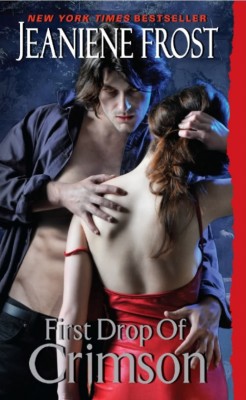
Jeaniene Frost is the author of the bestselling urban fantasy romance Night Huntress series that began in November 2007 with Halfway to the Grave. The most recent addition to the series is Destined for an Early Grave (Night Huntress, Book 4), which was released by Avon this past July. The Night Huntress series revolves around Cat Crawfield, a “halfbreed” (half vampire, half human), and her husband, Bones, a true vampire. Although Jeaniene has worked tirelessly to put out a new installment in the planned seven-book series every 6-8 months, fans continue to clamor for more stores about Cat and Bones. As a result, Jeaniene is taking a brief break from the Night Huntress series to work on a spin-off series about one of Cat’s friends, Denise MacGregor, and a vampire acquaintance of Bones’s named Spade. Fans were given the first glimpse of First Drop of Crimson, the first book in the new series, just a few days ago when Jeaniene was given permission to release the novel’s cover (shown above), setback, and an excerpt that includes the Prologue and first chapter. I was fortunate enough to speak with Jeaniene about her latest Night Huntress novel, Destined for an Early Grave (reviewed here), as well as First Drop of Crimson and a short story about Cat and Bones recently published in an anthology, Unbound, along with selections from authors Kim Harrison, Melissa Marr, Vicki Petersson, and Jocelynn Drake.
Below you can read the first part of my interview with Jeaniene Frost (it was a rather long one!) in which we discuss at length the fourth book in the Night Huntress series, Destined for an Early Grave. For those of you interested in the popular obsession with vampires that currently permeates our society, this portion of my discussion with Jeaniene will be particularly interesting given the amount of time we spent speaking about how vampires are constructed, both in film and literature, and what characteristics they may or may not have and why. We also discussed the way that the urban fantasy and romance genres are combined, as in Jeaniene’s novels, as well as popular reaction to this combination. If you’ve never read any of Jeaniene’s work, I highly recommend heading over to her web site and taking a peek at the various excerpts available there, including the one from First Drop of Crimson, and picking up a copy of Halfway to the Grave or Unbound.
Paige MacGregor: Now that I’ve read Destined for an Early Grave, I’m very curious as to what you would say some of your writing influences are?
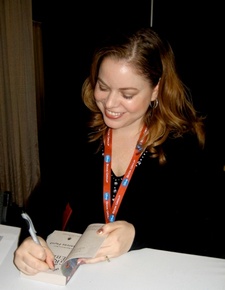
Jeaniene Frost, author
Jeaniene Frost: Well, influence as far as writing influences, I’ve been reading ever since, well, really an avid reader since I was twelve, and the first romance that I read that I can remember was Bertrice Small’s Sky O’Malley and that hooked me on the romance genre at a very young age. Then, when I was a teen, I read romance, but I also started reading darker fiction/borderline horror like Dean Koontz, Stephen King, and then in my twenties I started reading Diana Gabaldon, Laurell K. Hamilton. So all of those authors had an impact in me saying, ‘Wow, I wish I could do what they did.’ Those are the core authors that influenced me to start writing. All these authors had some dark elements of dark paranormal, they also had some humor, some romance and those were big influences.
PM: The writing process is a very unique process for everyone and I was curious what it’s like for you when you sit down to write a book like Destined for an Early Grave? I know that you love to write and you love to read, but where does the enjoyment end and the work begin?
JF: It’s funny because some days I am just really, really geared up to write and I can’t wait to get to my keyboard on my laptop and be down there working away at it for hours, happy as a clam, and other days I have to drag myself over to the laptop and it takes an hour or so of warm-up before I get into a groove. It really just depends. I think it was Nora Roberts who said something like, ‘You can’t depend on your muse when you write,’ and you can’t only write when you feel like it. Sometimes the hardest part is just dragging myself to sit in front of my laptop, but then once I’m there it’s fine and things start to flow.
PM: Destined for an Early Grave is the first book in the Night Huntress series that I’ve read and, as a new reader, I’m wondering how you came up with Cat as a character?
JF: She showed up in a dream. I’ve always had vivid dreams ever since as far back as I can remember dreaming — they play like little stories in my head — and I usually remember them the next day, too. It was a little before I turned thirty that I had a dream where I saw this woman arguing with a man and in the dream I just knew she was a half-vampire, he was a full vampire, and they were arguing because he was mad that she’d left him. And I also knew that she hadn’t wanted to leave him and she still loved him, but she completely didn’t think that their relationship would work and he completely wasn’t about to let her walk away that easily.
PM: Wow…
JF: [laughs] Yeah, so when I woke up the next morning, I had that in my head and I kept thinking about it, and unlike other dreams where I’ll think about it a little bit in the morning and maybe giggle about whatever the dream was, it stuck with me. I kept wondering ‘Who are these people?’ and what had brought them to the point of a half-vampire even knowing a full vampire and where she had left him when she clearly hadn’t wanted to. Brainstorming and turning that around in my head over and over and over became my first novel.
PM: That’s pretty impressive. I guess it’s a good thing that you remembered the dream when you woke up!
JF: I’ve also incorporated parts of my nightmares in my writing — I have this recurring nightmare where, and I’m sure a lot of people do, I’m being chased by someone who just won’t die. I probably have all the Halloween Michael Myers movies to thank for that. And so in my novels, vampires, you really can’t take them down very easily. So some of the things that have scared me in my nightmares have ended up in my books, as well. I take the good, the bad, and throw it in there and use it as part of inspiration.
PM: As you know, there are a lot of vampire things going on in the literary world right now, and the vampires take a lot of different forms and characteristics. How did you come to constructing vampires they way that they are in this series?
JF: Well, I wish I could say that I did a whole bunch of research and I looked up all the folklore, but actually I came up with my vampires by taking everything that I liked about the vampire myth from books and movies and things that I had seen ever since childhood and keeping that and taking everything I didn’t like about the vampire and throwing it out. When you’re a writer, in fantasy especially, you can make up your own rules — which is just the coolest thing ever because you can’t do that in real life. So the things that I didn’t like about the vampire myth like no reflection, being inherently evil, wooden stakes, not being able to go out in the daylight, not being able to enter a home unless invited, those things had always been a personal irritation of mine when I watched them or read them. So I just took that all out and came up with a reason why it didn’t apply to the vampires in my books. And that was fun because I got to write vampires the way I had always wanted to see and read them.
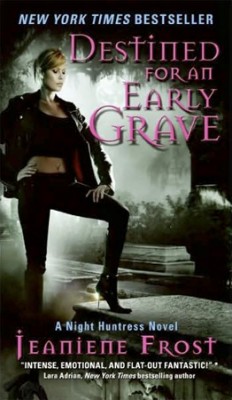 PM: I really enjoyed the way they were constructed in this series. I have to ask, though, what do you think of sparkly vampires?
PM: I really enjoyed the way they were constructed in this series. I have to ask, though, what do you think of sparkly vampires?
JF: Well I think that the vampire, the vampire genre, is great and so long-lived because of its diversity. You have vampires that are horror creatures and that are the villains and then, yeah, it swings the spectrum to vampires who sparkle and who don’t have fangs. The fact that there is so much room to maneuver within the vampire myth I think is one of the reasons it’s managed to stay so strong throughout the years. I think it’s whatever the author wants to create, and I’ve said before when a real vampire stands up and points out everything I’ve gotten wrong, I’m going to apologize very sincerely and then run for my life. Until then it’s anyone’s game as far as what authors want to endow or take away from their vampires. That’s part of the fun of writing fantasy — you can create your own rules. The only thing is that once you’ve created them you have to stick to them; readers don’t like it if you don’t.
PM: While researching the Night Huntress series online, I came across a lot of complaints about the way that books like yours combine the urban fantasy and romance genres. A lot of people seem to think that adding romance to the urban fantasy genre prevents books from being “true” urban fantasy or vice versa and I was wondering what you thought about that?
JF: Oh, what I thought about that couldn’t be printed. [laughs] I disagree. That’s the nicest way I can say that. I think that the idea that something isn’t urban fantasy if it has romance or relationships is just ridiculous because people have — in anybody’s life, there are relationships of some form or another, whether romantic, family, friendship, whatever, and a lot of times there are romantic relationships. I mean, if you look around at the people you know a lot of them are either in a relationship or they’ve just gotten out of a relationship, or they’re hoping to get back into one. So to say that sex or relationships cheapen the core of the urban fantasy story lacks any and all sense to me. People have a need for connecting, and a romantic connection is just as important as any other kind of connection and so to imply that all true heroes should be loners or they aren’t real heroes is baffling to me in the extreme.
PM: I was very surprised when I saw the debates going on online over how much romance can be included in an urban fantasy before it’s no longer “urban fantasy.” My reaction was that these people have far too much time on their hands. They need a hobby or something.
JF: [laughs] The other thing is that my books are shelved in romance and I consider them urban fantasy romance, but there’s a flip side to that that I’ve heard from some romance readers which is, ‘Well, if you have urban fantasy action in your book and if you have a plot that is just as relevant to the story as the romantic relationship then you shouldn’t be in romance, you should be in urban fantasy’ and I don’t agree with that argument either for the same reason. I think the genre is broad enough to encompass many different flavors. When you start to say ‘You can’t have this’ or ‘You can’t have that,’ then you start to insult the readers, in my opinion. You’re implying that readers don’t know what they like, and when you look at the numbers for urban fantasy with romantic elements and paranormal romance with urban fantasy elements the readers are speaking loud and clear.
~~~
Stay tuned for the rest of my interview with author Jeaniene Frost, and be sure to visit her web site where you can read excerpts from a number of her novels, including Halfway to the Grave, One Foot in the Grave, At Grave’s End, Destined for an Early Grave, and First Drop of Crimson. If you want to stay up to date on everything that Jeaniene is doing, make sure to follow her Twitter account and become a friend on MySpace.


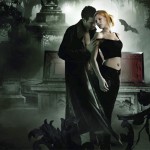
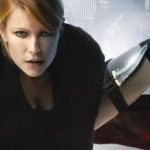
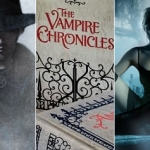

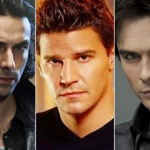
Pingback: Shades of Loving Souls | Literary Escapism
Pingback: | Literary Escapism